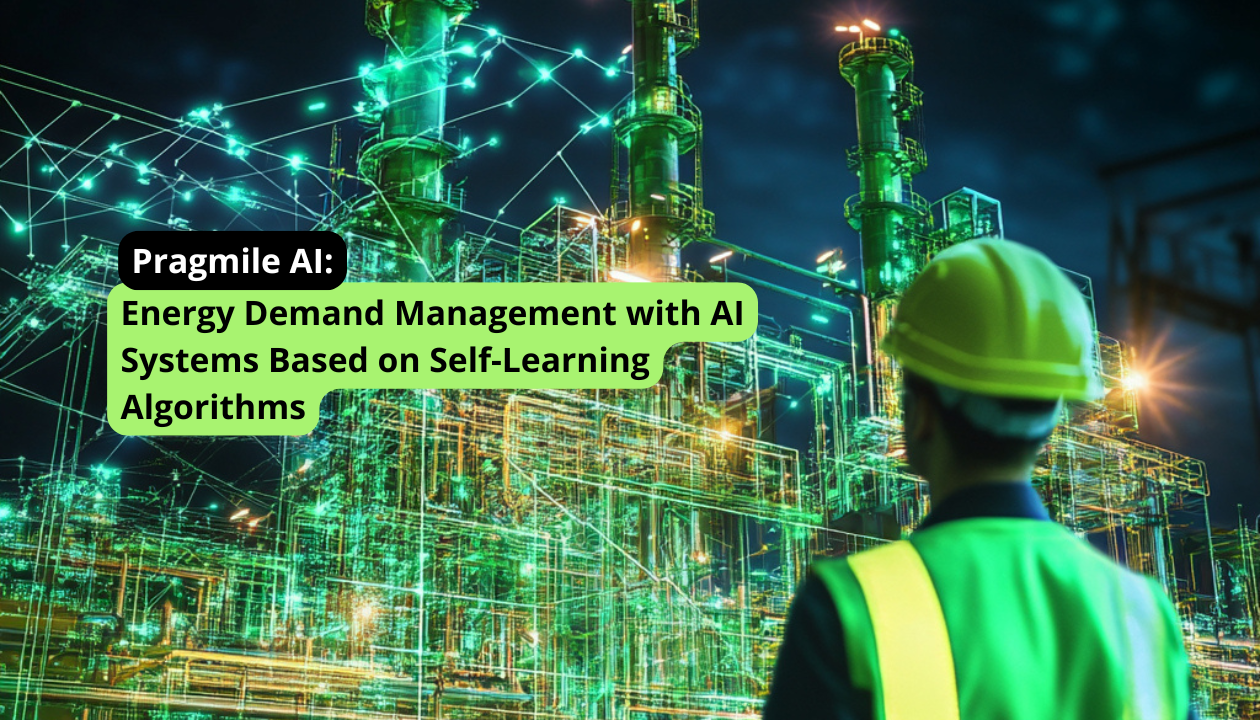
Date: January 15, 2025
Energy Demand Management with AI Systems Based on Self-Learning Algorithms
Growing energy demand, dynamically changing raw materials prices, and intensive environmental protection activities make effective management of energy resources one of the key global challenges and an element of sustainable development strategies. The use of artificial intelligence (AI) in the energy sector, especially AI systems based on self-learning algorithms and the ability to analyze huge amounts of data, allows for the optimization of energy production and distribution processes, as well as precise forecasting of demand. This in turn results in increased energy efficiency, reduced costs, and reduced emissions of harmful substances into the atmosphere.
What Is Energy Demand Management?
Energy demand management aims to control and regulate energy consumption by customers. It is the process of adjusting energy demand to available resources in order to increase energy efficiency and balance the load on the grid. This makes it possible to avoid overloads and reduce energy losses. Technologies that enable demand forecasting and dynamic supply adjustment to current consumption are crucial here.
Energy transformation, climate change, and rising energy costs make energy saving a priority for both households and businesses. A key aspect of this process is the effective use of available resources and the implementation of technologies that allow for better forecasting and demand management. The growing role of renewable energy sources, such as wind and solar, requires advanced tools to manage their variability. AI systems are perfect for this role, supporting renewable energy and sustainable energy management.
Smart Energy Management with AI – Energy Consumption, Energy Optimization and Energy Demand Forecast Supported by Artificial Intelligence
AI is playing an increasingly important role in the energy sector, enabling smart energy management. In 2023, the market was valued at $13.18 billion and is estimated at $15.45 billion in 2024 and at around $75.53 billion by 2034. AI can analyze large data sets on energy consumption, allowing for more accurate demand forecasting.
Self-learning AI algorithms can identify and analyze patterns in user behavior and predict changes in energy demand, which is crucial for effective management of energy systems. The first step in AI-powered energy management is data collection. This information comes from various sources, such as:
- Smart Meters – real-time energy consumption measurements that provide detailed information on the consumption profile of individual consumers.
- Sensors – data on temperature, humidity, solar irradiation, which allow for the adjustment of heating and cooling systems to external conditions.
- SCADA Systems – information about the status of the power grid, which enables detection of anomalies and potential failures.
- Weather Data – weather forecasts, which are crucial for optimizing energy production from renewable sources, such as photovoltaics or wind energy.
- Energy Price Information – market data on energy costs, which allows for the optimization of energy purchases in periods when prices are the lowest.
One of the most important applications of AI in energy management is forecasting future energy consumption (AI energy consumption). Based on historical data and external factors, such as weather forecasts, algorithms are able to predict what the demand for energy will be at a given time. Accurate energy forecasting is crucial for the following:
- Optimization of Energy Production (Energy Optimization) – precise forecasts can adjust energy production to current demand, which helps avoid overproduction or energy shortages.
- Energy Demand Management (Energy Demand Forecast) – forecasts can be used to encourage customers to change their energy consumption habits during periods of peak demand, for example by offering cheaper energy at night.
- Investment Planning – accurate forecasts enable better planning of investments in new energy sources and infrastructure.
Smart energy management systems (AI energy management systems) can monitor real-time consumption, identify inefficiencies, and suggest optimal solutions. Energy management software companies offer a variety of tools to help organizations achieve their energy efficiency goals.
An example is Solar Spy, an AI-powered SaaS platform for comprehensive management of small and large solar farms, which was developed in cooperation with Pragmile. Among other things, the solution analyzes weather data, historical energy consumption, and solar installation performance to accurately forecast solar panel energy production. This allows users to better manage their energy by predicting both demand and surplus energy for resale or storage.
AI Energy Management – Benefits of Using Artificial Intelligence in the Energy Sector and Energy Management
Implementation of AI systems based on self-learning algorithms brings significant benefits to both energy suppliers and end users. Among the most important aspects, it is worth mentioning the following:
- Efficient Use of Energy Resources – the ability to perform advanced energy demand forecasting (energy demand forecast) makes AI systems enable optimal use of available energy resources. This is particularly useful in the context of variability of production from renewable energy sources, such as solar or wind energy. Artificial intelligence algorithms precisely adjust energy production to current demand, minimizing losses and grid overloads.
- Reduction of Energy Costs – by optimizing energy consumption and production, companies and individual consumers can significantly reduce their electricity bills. AI systems (energy saving technologies) enable the use of energy in less expensive hours and reduce excess energy consumption during periods of peak demand.
- Increased Stability of Power Grids – implementing AI in energy demand management allows operators to dynamically respond to changing conditions in the power grid. In the event of large fluctuations in supply or demand, systems based on self-learning algorithms can automatically balance energy flows in power grids, which prevents blackouts and reduces the risk of failures.
- Facilitating the Integration of Renewable Energy Sources – renewable energy is characterized by high variability of production depending on weather conditions. AI systems help predict when photovoltaic panels or wind turbines will operate most efficiently and coordinate their operation with traditional energy sources, increasing the stability of systems based on renewable sources.
- Reduced Greenhouse Gas Emissions – optimizing energy demand management using AI allows for reducing the consumption of energy produced from fossil fuels. This enables energy suppliers and consumers to support climate goals and reduce their carbon footprint, contributing to sustainable development.
- Improving End-User Comfort – AI systems used in smart buildings enable automation of processes related to heating, cooling, and lighting, among others, adapting conditions to user preferences in the most energy-efficient way. This increases the convenience of use while reducing electricity consumption.
- Better Decisions Through Data Analysis – AI not only automates energy management processes, but also provides precise reports and forecasts that facilitate decision-making by both consumers and power grid operators. Access to detailed data on energy consumption and generation helps identify areas for improvement.
If you want to learn how artificial intelligence can support your energy business, schedule a free consultation with Marcin Jabłonowski – Managing Director and AI Solutions Architect at Pragmile.
Schedule a free consultation with
our AI and technology experts
Take advantage of the latest AI solutions, tailored to your company's needs. Book a consultation with AI solution architects at Pragmile and discover new opportunities in energy management.
Please, provide your business email to schedule a meeting

